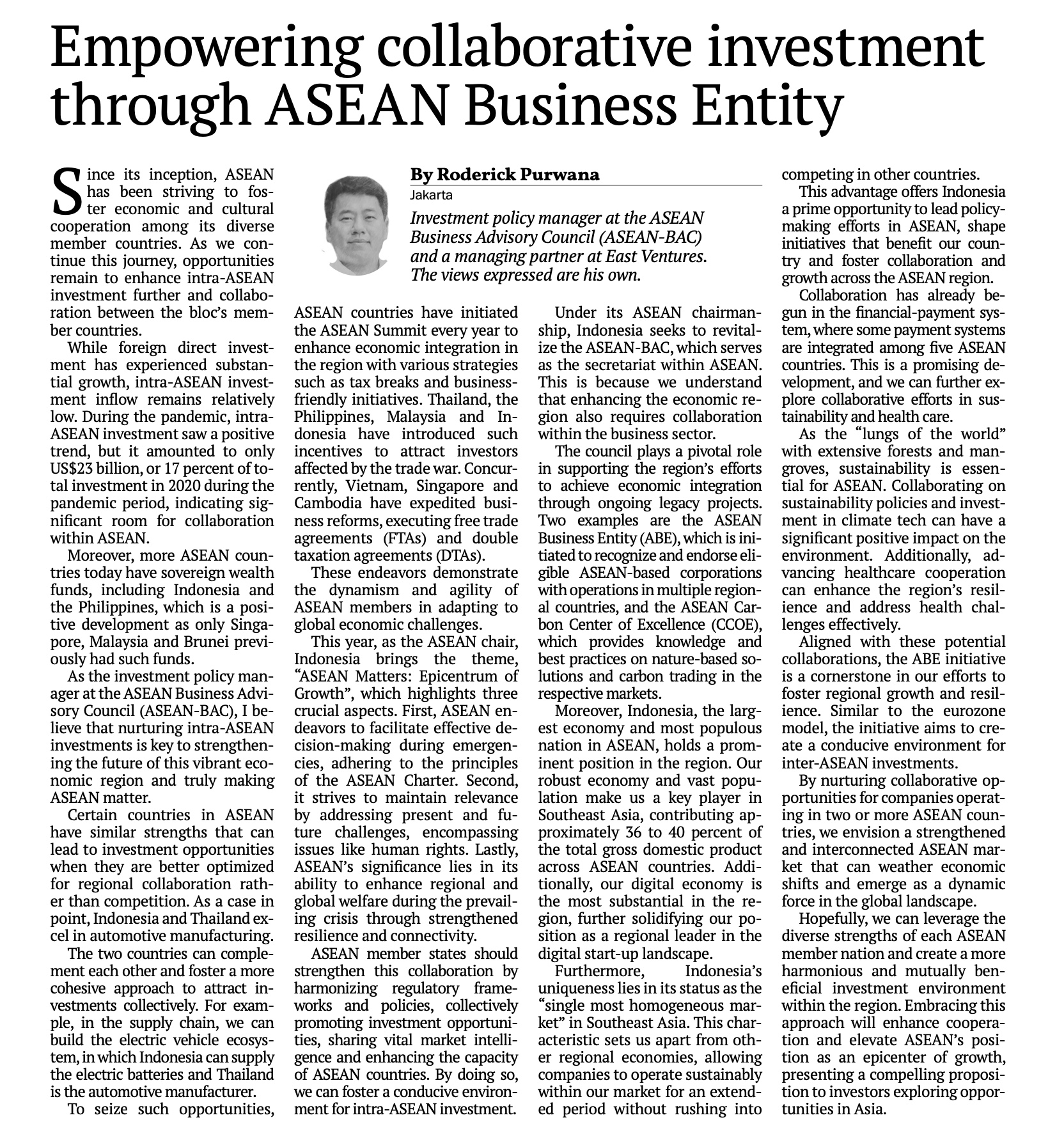The Association of Southeast Asian Nations (ASEAN) has come a long way since its inception, striving to foster economic and cultural cooperation among its diverse member countries. As we continue on this journey, opportunities remain to enhance intra-ASEAN investments further and collaboration between ASEAN countries.
While Foreign Direct Investment has experienced substantial growth, intra-ASEAN investment inflow remains relatively lower. During the pandemic, intra-ASEAN investment saw a positive trend, but it amounted to only US$23 billion, or 17% of total investment in 2020 during the pandemic period, indicating significant room for collaboration within ASEAN. Moreover, more ASEAN countries today have sovereign wealth funds, including Indonesia and the Philippines. This represents a positive development, as only Singapore, Malaysia, and Brunei previously had such funds.
As the investment policy manager at the ASEAN Business Advisory Council (ASEAN-BAC), I believe that nurturing intra-ASEAN investments is key to strengthening the future of this vibrant economic region and truly making ASEAN matter.
Certain countries in ASEAN have similar strengths that can lead to investment opportunities when it is better optimized for regional collaboration rather than competition. As a case in point, Indonesia and Thailand excel in automotive manufacturing. It has the potential to explore how both countries can complement each other and foster a more cohesive approach to attract investments collectively. For example, in the supply chain, we can build the electric vehicle ecosystem, in which Indonesia can supply the electric battery, and Thailand is the automotive manufacturer.
To seize such opportunities, ASEAN countries have initiated the ASEAN Summit every year to enhance economic integration in the region with various strategies such as tax breaks and business-friendly initiatives. Thailand, the Philippines, Malaysia and Indonesia have introduced such incentives to attract investors affected by the trade war. Concurrently, Vietnam, Singapore and Cambodia have expedited business reforms, executing free trade agreements (FTAs) and double taxation agreements (DTAs).
These endeavors demonstrate the dynamism and agility of ASEAN members in adapting to global economic challenges.
This year, as the ASEAN chair, Indonesia brings the theme, “ASEAN Matters: Epicentrum of Growth”, which highlights three crucial aspects. Firstly, ASEAN endeavors to facilitate effective decision-making during emergencies, adhering to the principles of the ASEAN Charter. Secondly, it strives to maintain relevance by addressing present and future challenges, encompassing issues like human rights. Lastly, ASEAN’s significance lies in its ability to enhance regional and global welfare during the prevailing crisis through strengthened resilience and connectivity.
ASEAN member states should strengthen the collaborations by harmonizing regulatory frameworks and policies, collectively promoting investment opportunities, sharing vital market intelligence, and enhancing the capacity of ASEAN countries. By doing so, we can foster a conducive environment for intra-ASEAN investments.
Under its ASEAN Chairmanship in 2023, Indonesia seeks to revitalize the ASEAN Business Advisory Council (ASEAN-BAC), which serves as the secretariat within ASEAN. This is because we understand to enhance the economic region also requires collaborations within the business sector.
The ASEAN-BAC plays a pivotal role in supporting the region’s efforts to achieve economic integration through some ongoing legacy projects. Two examples are the ASEAN Business Entity (ABE), which is initiated to recognize and endorse eligible ASEAN-based corporations with operations in multiple regional countries, and the ASEAN Carbon Center of Excellence (CCOE), which provides knowledge and best practices on nature-based solutions and carbon trading in the respective markets.
Indonesia’s key role in the ASEAN region
Moreover, Indonesia, the largest economy and most populous nation in ASEAN, holds a prominent position in the region. Our robust economy and vast population make us a key player in Southeast Asia, contributing approximately 36% to 40% of the total GDP across ASEAN countries. Additionally, our digital economy is the most substantial in the region, further solidifying our position as a regional leader in the digital startup landscape.
Furthermore, Indonesia’s uniqueness lies in its status as the “single most homogeneous market” in Southeast Asia. This characteristic sets us apart from other regional economies, allowing companies to operate sustainably within our market for an extended period without rushing into competing in other countries. This advantage offers Indonesia a prime opportunity to lead policy-making efforts in ASEAN, shape initiatives that benefit our country, and foster collaboration and growth across the ASEAN region.
Collaboration has already begun in the financial payment system, where some payment systems are integrated between five ASEAN countries. This is a promising development, and we can further explore collaborative efforts in sustainability and healthcare.
As the “lungs of the world” with extensive forests and mangroves, sustainability is essential for ASEAN. Collaborating on sustainability policies and investment in climate tech can have a significant positive impact on the environment. Additionally, advancing healthcare cooperation can enhance the region’s resilience and address health challenges effectively.
Aligned with these potential collaborations, the ABE project is a cornerstone in our efforts to foster regional growth and resilience. Similar to the Eurozone’s model, the initiative aims to create a conducive environment for inter-ASEAN investments. By nurturing collaborative opportunities for companies operating in two or more ASEAN countries, we envision a strengthened and interconnected ASEAN market that can weather economic shifts and emerge as a dynamic force in the global landscape.
I hope we can leverage the diverse strengths of each ASEAN member nation and create a more harmonious and mutually beneficial investment environment within the region. Embracing this approach will enhance cooperation and elevate ASEAN’s position as an epicenter of growth, presenting a compelling proposition to investors exploring opportunities in Asia.
By Roderick Purwana, Investment Policy Manager at ASEAN Business Advisory Council (ASEAN-BAC), Managing Partner at East Ventures.
The original article was first published in The Jakarta Post, Wednesday, 6 September 2023, on page 7.








